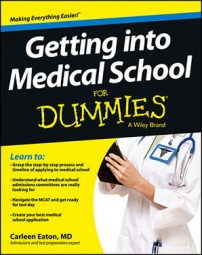Doing well in medical school requires being organized but flexible, as well as having a strong support system. Staying organized is important in med school because you’ll be called upon to learn more information in a shorter time than you would’ve imagined is possible.
The learning curve for being a medical student is steep and often requires on-the-job training; however, you can do some things to help start off strong and lay a solid foundation for the rest of your education.
Students who got by with a fly-by-the-seat-of-their-pants approach to academics as undergraduates may find themselves overwhelmed by the more intense demands of medical school. The number, difficulty, and pace of the courses you take as a med student are much greater than what you’ve likely encountered previously in your academic career.
Cramming simply doesn’t work when you’re juggling anatomy, biochemistry, introduction to clinical medicine, and a couple of other classes, for example, as well as possibly spending days with a physician preceptor in her practice and doing other required activities. Keeping up with the course load in med school requires that you prioritize and stay organized.
These tips can help you approach your academic responsibilities effectively:
Make a study schedule. Having a plan helps you allocate your time realistically and feel less stressed about getting everything done. At first, your schedule creates a very general guideline to follow, but within a couple of weeks, you know which classes require a greater investment of time and can fine-tune your plan accordingly.
Find out from second-year students which textbooks you really need. Frequently, the number of textbooks required and recommended for a course is greater than what you actually have time to read. Ask your peers who are farther along what materials are most important and then focus on those.
This strategy also saves you money if you end up not buying every book listed in the syllabus. You can usually access textbooks in the library, so if you just need to use a particular one occasionally, you don’t necessarily have to purchase it.
Don’t fall behind. The pace that classes move at is so rapid that catching up if you get even a few days behind can be difficult. You’re also likely to absorb the information better if you do some studying almost every day rather than taking multiple days off and then do a study marathon to catch up.
Develop a system to keep track of class materials. Even in the age of electronics, you quickly accumulate papers of all types for your courses.
For example, some students prefer to take handwritten notes because the act of writing helps them to retain information or because writing causes less eyestrain than using a laptop in class. Along with such notes, you may have printed handouts, copies of slides, and various other printed materials for your classes.
File everything in binders or folders immediately so that you don’t have to waste time searching for something when you need it. Do the same for electronic information related to courses by creating (and using) a folder for each class on your computer. Even a few minutes saved each day adds up and may give you an extra hour of precious leisure time by the end of the week.
You may find that the study system you used in college doesn’t translate to medical school. Be prepared for some trial and error as you find the best way to approach your classes, and be open to adapting your approach instead of being stuck doing things a certain way because that worked for you as an undergraduate. Medical school is a whole new game!

